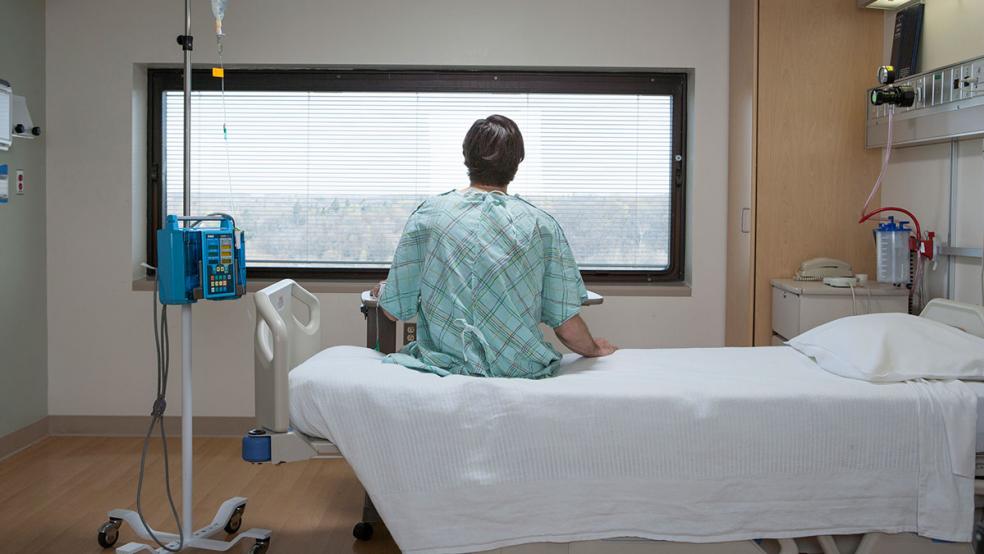Our country has a massive shortage of kidneys. As a result, many donation candidates endure years of dialysis, costing them quality of life and costing taxpayers billions.
According to government statistics, 460,675 Americans were on dialysis at the end of 2014. Two for-profit companies, Fresenius Medical Care and DaVita Healthcare Partners, Inc. dominate the market, serving 69 percent of dialysis patients. HBO’s John Oliver recently excoriated the companies for maximizing profits by providing inadequate patient service. Nationally, the cost of dialysis is over $40 billion annually, with three-quarters of the expenditures shouldered by Medicare. By law, the federal government pays for dialysis for patients whose private insurance does not cover it.
Dialysis patients suffer reduced quality of life and higher death rates. Patients receiving hemodialysis (the most common type of dialysis, using a manufactured membrane to filter the blood) require three sessions per week, each lasting four hours, which can be exhausting. They also face dietary restrictions. Those receiving the alternate therapy, peritoneal dialysis (using the lining of the stomach to filter the blood), have fewer dietary limitations but require daily treatments.
Related: One Life, Two Organs, a $5.3 Million Bill
In 2014, 16.6 percent of dialysis patients died, compared to 3 percent of kidney transplant recipients. Although this is partially due to the higher average age of dialysis patients, the government reported that “Dialysis patients continue to have substantially higher mortality, and fewer expected remaining life years, compared to the general population and Medicare populations with cancer, diabetes, or cardiovascular disease.”
A better solution is to offer valuable incentives to encourage more live donors to part with one of their kidneys. With dialysis being so expensive, onerous and ultimately fatal, kidney patients and taxpayers would be better off with more donations. But in the United States, relatively few people step forward to donate one of their kidneys while alive. In 2014, a total of 17,914 patients received kidney transplants, but only 5,574 of these came from live donors, and all but 181 of these came from a friend or relative of the patient.
Although people can live normal, full lives with a single kidney, donating can be expected to cause discomfort, inconvenience and risk. The National Kidney Foundation says that donors usually remain in the hospital four to six days, experience tenderness and mild pain in the incision area and should take measures to protect their remaining kidney, such as avoiding contact sports. Each year, thousands of people decide that these are small sacrifices for the benefit of helping a friend, loved one or even a stranger. Unfortunately, not enough people feel this way. As a result, the waiting list of candidates for kidney donations has swelled to about 97,000 patients. Even that figure may be low: While many dialysis patients are too unhealthy to qualify for a donation, some otherwise qualified candidates have been discouraged from seeking kidneys by counselors at for-profit dialysis providers.
Related: US Morgues Can't Keep Up With Wave of Opioid Deaths
An obvious solution to the shortage of kidneys is to permit a market for donated organs. In the United States, though, the sale of human organs has been illegal since 1984 under the National Organ Transplant Act (NOTA), sponsored by Al Gore and Orrin Hatch. The prohibition appears to have been in response to a Virginia doctor’s plan to buy kidneys from Third World donors and poor Americans and then sell the organs to richer Americans. The President of the National Kidney Foundation said at the time, ''It is immoral and unethical to place a living person at risk of surgical complication and even death for a cash payment to that person.''
Aside from fears that an organ market would allow the rich to exploit the poor, there is also the fear of organ theft. In the 1990s, stories began circulating of travelers being drugged and then waking up the next morning without one of their kidneys, ostensibly the victims of an organ-smuggling ring. But this meme, widely circulated across the internet, has been debunked. There is no evidence of it ever happening.
Nonetheless, the aversion to organ markets has been such that they are illegal everywhere around the world except Iran. (Israel and New Zealand offer modest incentives to donors, though.) Given the amount of negative publicity Iran receives in the West, it may be hard to see the Islamic Republic as an exemplar of anything. But a 2016 Associated Press report found that Iran’s approach to live kidney donations functions well. Donors and recipients are matched by a not-for-profit organization, typically within six months. In addition to receiving about $4,500 for their kidney, donors get free health coverage for one year and reduced health insurance thereafter from government hospitals. There is no shortage of kidneys.
Related: How Millions of Aging Baby Boomers Could Bust the Economy
While there is little support for an Iranian-style organ market in the United States, there is an increasing realization that finding more live donors will involve offering them incentives to give up a kidney. A reform that compensates donors without allowing recipients to pay for organs is a viable middle ground. The government could fund such a program with cost savings on dialysis. One estimate puts the potential savings at as much as $12 billion a year.
Last year, Rep. Matt Cartwright (D-Penn.) introduced the Organ Donation Clarification Act, which would have allowed state and local governments to implement pilot programs offering non-cash benefits to live organ donors. These in-kind benefits might include a tuition voucher, loan forgiveness or a contribution to the organ donor’s designated charity. In addition, Cartwright’s legislation would have clarified language in NOTA to establish that cash reimbursement for donor travel expenses, medical costs and lost wages is permissible. The bill attracted 11 bipartisan cosponsors but did not move out of committee.
Cartwright’s office told me that he plans to reintroduce the legislation in the current Congress. Once he does, he will have the support of a group of D.C. policy wonks who have created the Organ Reform Group and Network. One of the group’s members, economist Kurt Schuler, donated a kidney to a stranger in 2014 under the current system, but believes that incentives are needed to end the nation’s kidney shortage.
Whether or not you agree that live donors should be compensated for their kidneys, I hope we can all agree that donating our organs at death is no sacrifice. While this issue is on your mind, consider signing up for the organ registry at https://organdonor.gov/register.html.






